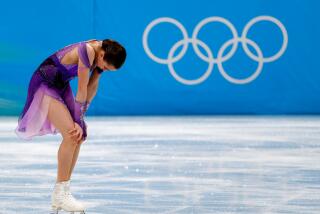Decathlete Johnson Is Subject of Probe : Track and field: A potentially positive result from March drug test is quietly under review.
- Share via
GOTEBORG, Sweden — While Dan O’Brien prepares for his assault on 9,000 points in the World Championships’ decathlon competition that begins here Sunday, the other half of one of track and field’s best known television advertising campaigns, Dave Johnson, is at home in Southern California, attempting to prolong his career amid suspicion about whether he has used an illegal, performance-enhancing substance.
Johnson, the 1992 Olympic bronze medalist, appears to have a legitimate defense, so much so that the International Amateur Athletic Federation, which governs the sport, has not rushed to judgment against him while reviewing his potentially positive result in a random, unannounced drug test in March.
“Dave Johnson has never had a test result that showed he has used any illegal or banned substances,” said Mike Bone of Pacific Sports Productions, Inc., a marketing firm that represents the decathlete, in a statement Thursday. “He is unequivocally clean. He always has been and always will be.”
The test, however, did reveal a higher level of the male hormone testosterone than usually considered acceptable. His ratio of testosterone to epitestosterone was higher than 6:1, the number which laboratory analysts have liberally fixed as an alarm to the possibility that an athlete is illegally taking the hormone externally. The ratio for normal males has been determined to be 1:1.
Although the IAAF made no official announcement of Johnson’s test result, an official here for the World Championships leaked it to reporters this week. Three other officials independently confirmed it Thursday.
Johnson could not be reached for comment.
In his favor, oddly enough, is that he had another reading of higher than 6:1 in 1993 and was not suspended, having presented evidence to the IAAF that his level is naturally produced. IAAF officials are concerned in this case because the level was slightly higher than two years ago, but medical experts have told them that is not necessarily unusual. Legal experts also are prepared to testify on his behalf if necessary.
USA Track and Field officials, who would not speak for attribution because their rules prevent them from commenting on active drug cases, said they are confident he again will be exonerated.
If not, Johnson, 32, of LaVerne, faces a four-year suspension, which would end his career. He is a four-time U.S. champion who, because of injuries, has finished 15th and 17th in the last two nationals. The most recent was in June at Sacramento, after which he said his goal was to regain his fitness in time to become a medal contender in the 1996 Olympic Games at Atlanta. Competing last week in the U.S. Olympic Festival at Colorado Springs, Colo., he achieved a personal best in the javelin.
This latest episode will probably generate as much scrutiny of the controversial testing for testosterone as it is of Johnson. Critics claim that it is impossible to test accurately for a natural substance because not all bodies produce the same amount.
There has even been some movement among lab experts who believe that it is necessary to continue testing for the hormone to prevent it from becoming even more popular than it already is as a performance enhancer.
“The theory in 1984, when we first started testing for testosterone, was that there was no male who could be over 6:1 without taking it,” said Dr. Don Catlin, director of the UCLA lab, who agreed to speak about the subject in general but not Johnson’s case specifically. “But every year, more and more cases are found in which the natural level is higher. It happens in one in a thousand or one in 2,000 cases.”
Although athletes initially received automatic suspensions if their ratio was higher than 6:1, the rule now prohibits officials from declaring tests with similar results positive until after an investigation.
More to Read
Go beyond the scoreboard
Get the latest on L.A.'s teams in the daily Sports Report newsletter.
You may occasionally receive promotional content from the Los Angeles Times.






